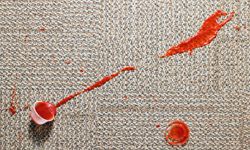Key Takeaways
- Some of the toughest food stains to remove include coffee, tea, gum, peanut butter, mustard, berry juice, tomato-based sauces, baby food, red wine, chocolate, cooking grease and butter.
- For coffee or tea stains, rinsing in hot water or treating with dishwashing liquid can be effective. Meanwhile freezing and scraping is a method for gum removal. You may need specific cleaning agents like borax for tougher stains.
- Quick action and appropriate treatment methods help minimize damage and improve the chances of completely removing the stain.
Food is essential to life -- and a lot of fun to eat, too. That's what makes it so tragic when good food goes bad. By bad we don't mean inedible. We mean the type of bad that happens when the foods you love -- and trust -- run amok all over your precious clothing. It's amazing how a little Alfredo sauce can breathe life into a forkful of tortellini -- or completely destroy a silk blouse.
We'd like to say there are measures you can take to keep your belongings absolutely stain free, but short of swaddling everything you own in plastic -- or eating naked -- the safest way to protect your belongings from food stains is to develop a few effective strategies for dealing with food flubs and meal mishaps whenever and wherever they happen.
Advertisement
Since time is usually of the essence when removing food stains, having access to a stain remover pen is a good idea. One of these wizards of wash day is the size of a yellow highlighter, which makes it easy to store in a handbag, glove compartment or desk drawer. Stain remover pens won't get out every kind of stain, but they are a good first line of defense. To become a food stain removal expert, you need to recognize that different stains need different treatments. In the next pages, we'll take a look at 10 of the worst food stains around and explore some of the most effective ways to banish them.





